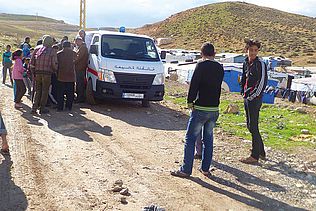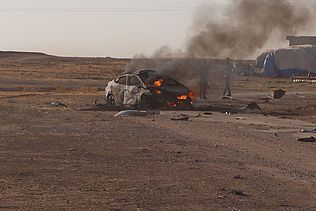Wieder ruft die syrische Opposition „Tagen des Zorns“ auf. Es wird sich zeigen, ob das erprobt repressive Kalkül des Assad-Regime aufgehen wird, mit Scharfschützen, Panzerverbänden und gezielten Massenverhaftungen den anhaltenden Protest niederzudrücken. Mittlerweile hat die Kritik an der blutigen Repression auch den Machtapparat selbst erreicht. In den letzten zwei Wochen traten allein 230 Mitglieder der ehedem monolithischen Baath-Partei, die seit 1963 ununterbrochen an der Macht ist, öffentlich zurück. Auch in der Armee scheint es erste Brüche zu geben. So gibt es glaubwürdige Berichte aus der eingekesselten Stadt Daraa, dem Ausgangspunkt der Revolte, dass es in der als besonders loyal geltenden 5. Brigade, die von Präsident Assads Bruder Maher kommandiert wird, zu zahlreichen Fällen offener Befehlsverweigerung gekommen sei. So hätten einzelne Offiziere sich den Demonstranten angeschlossen oder sich geweigert willkürliche Verhaftungen an Checkpoints durchzuführen.
Säkulares Bündnis im In- und Ausland
Auf diesen Prozess eines wachsenden Widerspruchs innerhalb der Reihen des Regimes, verknüpft mit einer stetigen Ausweitung der Proteste, setzt auch das sich jüngst formierte Oppositionsbündnis „The National Initiative for Change“, in der nach eigenen Angaben mehr als 150 Vertreter verschiedener politischer, religiöser und auch ethnischen Parteien und Institutionen in Syrien zusammenarbeiten. Die Namen all jener, die in Syrien leben, werden aus nachvollziehbaren Gründen nicht veröffentlicht. Bekannt sind dagegen diejenigen, die sich aus dem Exil für eine Veränderung in Syrien einsetzen.
Einer von ihnen ist der heute in Washington lebende Menschenrechtler Radwan Ziadeh, der 2001 zu den Aktivisten des „Damaszener Frühlings“ gehörte, die mehr Freiheitsrechte und ein Ende der Einparteienherrschaft forderten. Wegen seiner Menschrechtsaktivitäten erließ die syrische Justiz 2008 Haftbefehl gegen ihn. Radwan Ziadeh lernte ich im Februar dieses Jahres im schwäbischen Bad Boll kennen. Hier waren auf Initiative der IPPNW und medico international Menschenrechtler und NRO-Vertreter aus der Türkei, Kurdistan (Türkei und Irak), Irak, Syrien, Ägypten, dem Iran, Kuwait, Israel und Palästina mehrere Tage zusammengekommen, um über Möglichkeiten einer Zusammenarbeit und Kooperation für einen demokratischeren Nahen und Mittleren Osten nachzudenken. Gemeinsam sahen wir am 14. Februar im Livestream eines arabischen Senders, der via Laptop empfangen werden konnte, wie der tunesische Herrscher Ben Ali im Flugzeug das Land verließ. Radwan Ziadeh war schon damals recht zuversichtlich, dass dies der revolutionäre Funke sein könnte, der die ganze Region in Bewegung bringen würde - und er hoffte auf eine Resonanz in Syrien. Aus eigener Erfahrung macht sich der Menschenrechtler keinerlei Illusionen über die Reformfähigkeit des gegenwärtigen syrischen Regimes: „Assad ist kein Reformer“, erklärte Ziadeh unlängst im österreichischen Fernsehen: „Reformen auf Syrisch: das heißt, Menschen mit Elektroschocks zu foltern und ihnen auf die Hände und Köpfe zu schlagen.“
Agenda für den Wechsel
Vor wenigen Stunden schickte Radwan Ziadeh uns die jüngste Erklärung der „The National Initiative for Change“. Erstmals stellt das Oppositionsbündnis eine konkrete Road Map für den demokratischen Übergang vor. Für ihn und andere Menschenrechtler gibt es angesichts der aktuellen Gewaltexzesse nur zwei Optionen: Entweder entscheidet sich das Regime für einen demokratischen Wechsel, oder aber dem Land droht ein blutiger Bürgerkrieg. Jetzt geht es nicht mehr nur um die Aufhebung des Ausnahmezustands, sondern um weitergehende Bürger- und Freiheitsrechte. Alle politischen Gefangenen müssen entlassen, alle verbotenen Parteien zugelassen, allen unterdrückten Minderheiten, wie den Kurden, gleiche Rechte zugestanden und ein konstitutioneller Prozess des politischen Übergangs eingeleitet werden. Als mögliche Garanten einer solchen institutionellen Revolution benennt die Initiative das syrische Militär und vorallem den gegenwärtigen Verteidigungsminister Habib. Die Armee als nationale Institution und der politische General in der Regierung verfügen weiterhin über eine breite Akzeptanz in der Gesellschaft und könnten den Übergang hin zu freien Wahlen moderieren. Für Präsident Assad bleibt in diesem Szenario nur ein letzter historischer Dienst: „Wenn der syrische Präsident nicht als ein Führer des Übergangs in die Geschichte eingehen möchte, dann bleibt den Syrern allein die Möglichkeit auf jenem Weg vorwärtszugehen, den bereits die Tunesier, Ägypter und Libyer beschritten.“
Es folgt die vollständige Erklärung. Kontakte zu den Initiatoren können über medico hergestellt werden.
Martin Glasenapp, 29.04.2011
_______________________________
National Initiative for Change
Syrian Opposition Demand The Army to Protect Civilians and Facilitate a Transitional Period
For Immediate Release Damascus, 29 April 2011
Background
Last Friday, 84 different cities and towns in Syria witnessed massive protests, 400 have been killed since the Syrian revolution started on March 15, with hundreds missing and thousands that have been detained. This popular uprising will lead eventually to the overthrow of the regime. It is imperative that we put an end to the arguments of Syrian exception. Our ultimate dream, as loyal Syrian nationals, is first to witness our country become one of the best nations in the world. Given that we are witnessing profound “revolutionary” changes not seen in the Arab region since the 1950’s and that we do not want a single drop of blood to be shed by any Syrian, we aspire to learn from other experiences and apply it to our case starting from experiments of transitions to democracies in Western Europe in the 1970’s, Latin American in the 1980’s, Eastern Europe in the 1990’s and what the Arab world is experiencing today as a result of successful popular revolts overthrowing regimes that had been in power for three decades or more.
Situation Now
Syria today only faces two options; either the ruling regime leads itself in a peaceful transition towards democracy –and we are very doubtful to the desire or will of the regime to do so- or it will go through a process of popular protests that will evolve into a massive and grassroots revolution that will breakdown the regime and carry Syria through a period of transition after a wave of violence and instability. Therefore Syria is at a crossroads; the best option is for the leadership of the regime is to lead a transition to democracy that would safeguard the nation from falling into a period of violence, chaos and civil war.
Moving Ahead
Syria can accomplish this goal by many means. Political reform should start with re-writing the constitution in a modern democratic fashion that guarantees basic rights to its citizens and emphasizes a system of checks and balances between branches of government. This means a complete separation of the three branches of government: judiciary, executive and legislative. This would also include a radical reform of the judicial system or institutions that have been overcome with corruption and loss of trust by the citizens. This includes the lifting of the state of emergency and all extrajudicial special, martial and field courts -especially the State Security Court-, the release of all political prisoners, the legislation of a modern law governing political parties that would ensure the participation of all Syrians with no exceptions, the reform of media laws and regulations in order to guarantee freedom of the press, the legislation of a new election law, and the forming of a national committee for truth and reconciliation to investigate Syrians who have disappeared and to compensate political prisoners. Above all comes the granting of all political rights to Kurds, the removal of all forms of systemic discrimination practices against them and the prioritizing of eastern provinces in development and infrastructure projects.
The safe transition period in Syria must be based on a firm conviction that the Syrian population completely lost faith in the executive authority, on top of it is the president, his deputies, the prime minister, and the parliament or the People’s Council that has no role in the decision making process and its members are elected with no minimum standards of credibility, transparency and integrity in addition to the election law that regulates the political process rendering it no role in the transition process. Therefore, the only institution that has the capability to lead the transition period would be the military, and especially the current Minister of Defense General Ali Habib and the Chief of Staff General Dawud Rajha. Both individuals represent a background that Syrians can positively relate with that enables them to take a key pivotal role during the transition process by leading negotiations with civilian representatives from the leadership of the opposition or other respected individuals to form an interim government. By entering the negotiation phase that should take us on a specified timeline to accomplish the democratic transition by first drafting an interim constitution for the country that should be ratified by a national referendum. The transition government will be responsible to monitor the elections and safeguard the successful accomplishment of the transition period beginning with certifying a new constitution drafted by professional constitutional and reform specialists. Afterwards, the interim government shall issue a new election and political party law to regulate the election process for the president and members of the parliament which is monitored by an independent national committee based on judicial as well as domestic and international observers with an open door policy welcoming the formation of political parties that will participate in the elections. If the Syrian President does not wish to be recorded in history as a leader of this transition period, there is no alternative left for Syrians except to move forward along the same path as did the Tunisians, Egyptians and Libyans before them.
Signatories inside Syria:
150 politicians, civil society activists and human rights defenders (names are not published for personal safety reasons but will be provided to media).
Signatories outside Syria:
Yahya Mahmoud, Amer Mahdi, Najib Ghadbian, Saleh Moubarak, Ausama Monajed, Obaida Faris, Mohammed Askaf, Ammar Abdulhamid, Mohammed Zuhair Khateeb, Khawla Yousef, Abdulrahman Alhaaj, Douha Nashef, Mahmoud Alsayed Doughaim, Mouhja Kahf, Feras Kassas, Ammar Kahf, Aref Jabo, Mohyeddin Kassar, Abdulbaset Saida, Mazen Hashem, Hassan Jamali, Osama Kadi, Radwan Ziyadeh
Coordinators inside Syria:
Adnan Mahamid, Ayman Al-Aswad
Coordinators outside Syria:
Radwan Ziadeh, Ausama Monajed, Najib Ghadbian



![Desinfektion und Sterilisation von Wassertanks durch den Kurdischen Roten Halbmond [Foto: Heyva sur a Kurd]](/fileadmin/_processed_/7/3/csm_Cholera3_fa520ee816.jpg)
